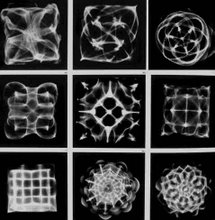Today we talk about how people bring science into their everyday lives and how certain facets of science become part of common knowledge. Kamal Fox, who holds an MA in Media Studies and teaches communications to engineers, and I quizzed several students on the McGill campus and asked them what they think about the sciences - what they had to say mirrors the complexity of our general relationship to science - we play those clips throughout the show. And Hannah Hoag, science journalist and former science graduate student, addresses where we get our science information, as well as the commonly understood divide between hating and loving science and between science and arts.
This divide in education obviously stems from a wider social divide though. For instance, I was listening to an episode of Tapestry where Ursula Franklin, Ph.D. in experimental physics, mentor to a generation of engineers and women in science, Companion of the Order of Canada, author, peace activist, and Quaker, generally brilliant person (and Canadian). She was responding to a question about how science affects our lives and our personal beliefs, Ursula Franklin on a recent episode of CBC’s Tapestry: “As I see it, all that science brings us, the inherently increased knowledge of the world around us, brings me to just knowing how little I know and how much more there is. But also, when you look at what science has brought from the cosmic to the molecular to the atomic – we’ve learned that nature works, and it’s amazing that nature works, we’ve learned that nature works frugally with a minimum of waste, and the products of nature are beautiful. Why would anyone think that any being of any form would be threatened or contradicted by the accumulating results of scientific inquiry? Then you can argue with scientists, what do you do with your knowledge? And that’s where I argue that my belief doesn’t allow me to make an atomic bomb but that’s not science, to me that’s the use, that’s society of which scientists are an integral part.”
Listen to the show!

